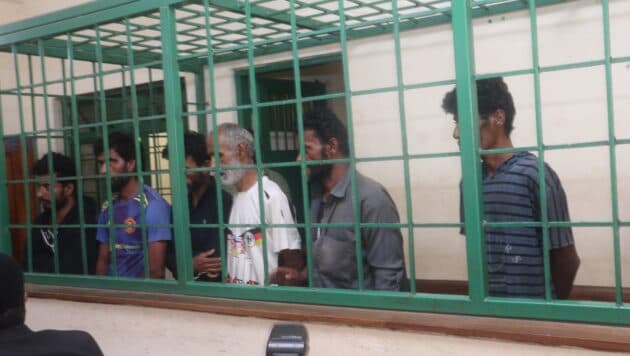We're loading the full news article for you. This includes the article content, images, author information, and related articles.
The detention underscores Kenya's critical role as a transit hub for international drug syndicates and poses a significant test for the nation's judicial and security frameworks in combating large-scale narcotics trafficking.

A Shanzu court has ordered six Iranian nationals to be detained pending a formal application by the Director of Public Prosecutions (DPP) to hold them for 30 days. The decision, delivered on Tuesday, 28 October 2025, follows one of Kenya's largest-ever narcotics seizures, involving 1,024 kilograms of methamphetamine with an estimated street value of Ksh8.2 billion. The suspects were identified as Jasem Darzadeh Nia, Nadeem Jadgal, Imran Baloch, Hassan Baloch, Rahim Baksh, and Imtiyaz Daryayi.
The case began on Saturday, 25 October 2025, when a multi-agency security team intercepted a stateless dhow, codenamed 'IGOR', approximately 630 kilometers off the coast of Mombasa in the Indian Ocean. The operation, codenamed 'Bahari Safi 2025.01', was initiated after the Kenya Navy, working with international partners, flagged the suspicious vessel which had reportedly been evading crackdowns for some time. A joint force comprising the Kenya Navy, the Directorate of Criminal Investigations (DCI) Anti-Narcotics Unit, the Kenya Coast Guard, and the National Authority for the Campaign Against Alcohol and Drug Abuse (NACADA) boarded the vessel and escorted it to the Kilindini Port. Upon a court-sanctioned search, officers discovered 769 packages of the crystalline substance.
During their arraignment at the Shanzu Law Courts on Monday, 27 October 2025, the prosecution requested additional time to complete its complex, transnational investigation. State prosecutors informed the court of their intent to seek a 30-day detention period to allow investigators to conduct forensic analysis on seized electronic devices, including a Thuraya satellite phone and a GPS device, which they believe are key to dismantling the wider trafficking network. An affidavit sworn by Inspector Shadrack Kemei of the DCI's Anti-Narcotics Unit highlighted that the suspects are part of a major transnational syndicate and, as foreign nationals with no fixed abode in Kenya, pose a significant flight risk. The prosecution also sought time to verify the credentials of a court interpreter to ensure fair and accurate proceedings. The magistrate ordered the suspects to be held at the Port Police Station pending a formal ruling on the extended detention application.
This monumental bust casts a harsh spotlight on East Africa's growing role as a major conduit for narcotics trafficking. According to the United Nations Office on Drugs and Crime (UNODC), the 'Southern Route' is increasingly used to traffic heroin and methamphetamine from Afghanistan and Iran through the Makran Coast to East and Southern Africa, en route to markets in Europe and other parts of the world. Reports indicate that heroin seizures in East Africa have increased nearly tenfold in recent years, signaling the region's vulnerability due to porous coastlines and, at times, weak criminal justice systems.
DCI Director Mohamed Amin stated that investigations are underway to determine the precise origin and intended destination of the massive consignment. This case follows a pattern of foreign nationals being arrested in Kenyan waters for trafficking, echoing the 2014 seizure of the MV Al Noor, which ultimately saw the case collapse due to challenges in proving jurisdiction and handling evidence—lessons the Office of the DPP will be keen to avoid repeating.
The case is being prosecuted under Kenya's stringent Narcotic Drugs and Psychotropic Substances (Control) Act. Recent amendments to this law impose severe penalties for trafficking, including fines of up to Ksh50 million and life imprisonment, reflecting a tougher government stance on the issue. A conviction in a case of this magnitude would represent a significant victory for Kenyan law enforcement and its international partners.
However, the Kenyan judicial system faces immense pressure. High-profile drug cases are often lengthy and complex, with traffickers exploiting legal loopholes to evade justice. The successful prosecution of the six Iranians will depend on meticulous evidence gathering, preserving the chain of custody, and robust international cooperation. The outcome of this case will be closely watched as a barometer of Kenya's capacity to disrupt the global narcotics trade and secure its maritime borders against powerful transnational criminal organizations.
Keep the conversation in one place—threads here stay linked to the story and in the forums.
Sign in to start a discussion
Start a conversation about this story and keep it linked here.
Other hot threads
E-sports and Gaming Community in Kenya
Active 9 months ago
The Role of Technology in Modern Agriculture (AgriTech)
Active 9 months ago
Popular Recreational Activities Across Counties
Active 9 months ago
Investing in Youth Sports Development Programs
Active 9 months ago